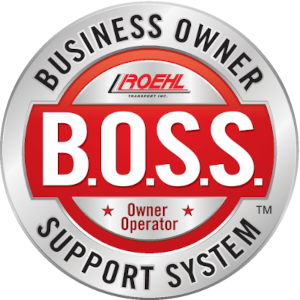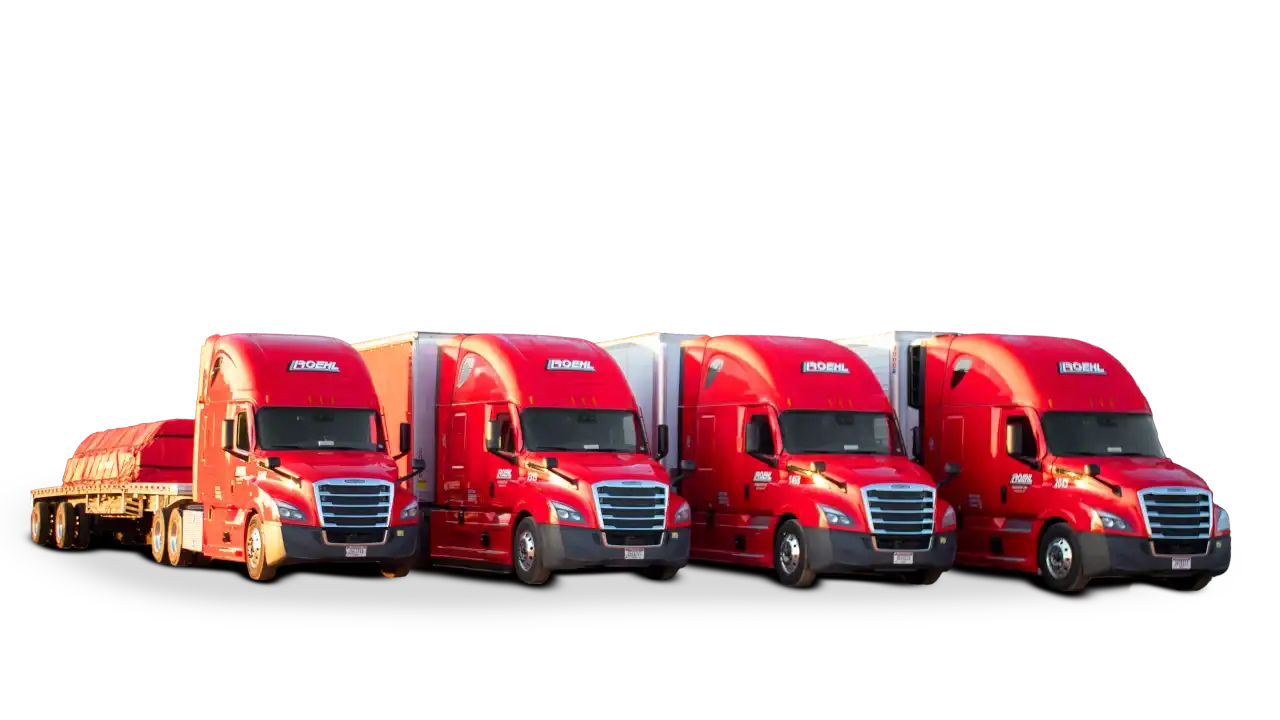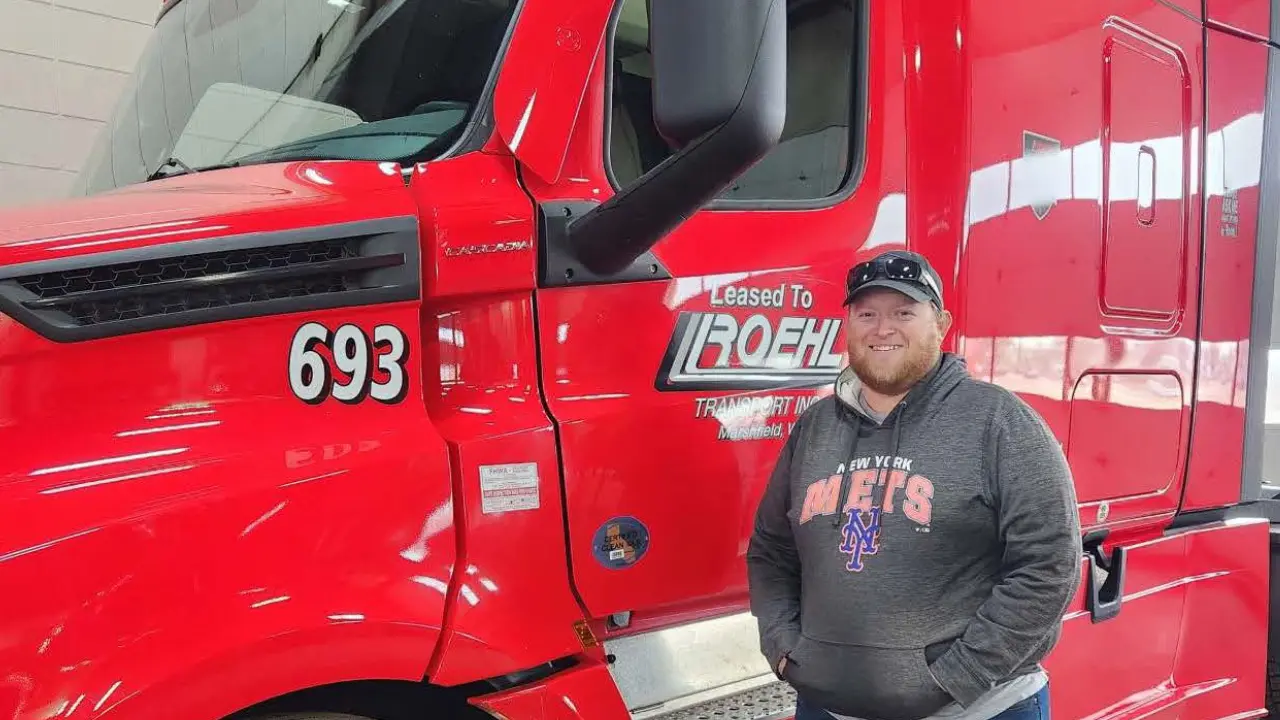
Steps to Become an Owner Operator Truck Driver
Get B.O.S.S. Benefits!
Maximize your earnings, manage your costs and get into the best position to move freight as your own B.O.S.S. Fill out this form & let's connect!
When you’re an Owner Operator, you get B.O.S.S. Benefits.
Control only rolls one way here: to the industrious men and women who set out to put more of themselves in their work.
We give all the support without taking away any of the control. Being an Owner Operator at Roehl put you in a great position to move freight as your own BOSS. Major benefits of building or launching your Owner Operator business with us include:
- A business advisor that works with you for the loads that support your business.
- Mileage-based compensation.
- Top fuel surcharge program.
- Affordable truck lease/purchase program.
- Business ownership training and support.
- Assistance with your business structure.

Already have your truck? Need a truck? Starting your own trucking business?
It doesn’t matter if you need training for your CDL, already have a truck or are an experienced truck driver looking to apply for our lease purchase program, we’ll give you all the support you need to transition into one of the trucking industry’s top Owner Operator programs.
If you’re an existing Owner Operator with your own truck, let’s talk about how you can partner with Roehl. Our Owner Operator Specialist can provide the information you’ll need to partner with Roehl, including the required truck and trailer specifications.
Do you need a truck?
If you’re an existing Owner Operator and need a truck, we have a truck lease that will meet your needs. We’ll get you set up with a lease purchase agreement that automatically deducts tractor payments and other business-related expenses from your settlements. So you don’t have to worry about initiating payments and can instead focus on growing your business.
Help for first time owner operators.
Do you want to start your own trucking business? If you’re an experienced company driver and want to be an owner operator, we offer business training and affordable truck leases to help you become the BOSS.
How to Become an Owner Operator.
If you’ve never been an owner operator before, here’s what you need to do to partner with Roehl Transport. Running a business requires additional skills and abilities in your toolbox. Roehl Transport started as a small business, and we’ve provided this overview to help company drivers and those who want to own a trucking business themselves.
Business Training.
As an owner operator partnering with Roehl Transport, you’ll be enrolled at Roehl Youniversity to take advantage of special finance and business education that will help with your business ownership success. You will also receive premium driver training and learn about the Roehl value of safety - perks you will not find with other trucking companies. We partner with ATBS, the largest provider of owner operator & independent contract services in the United States.
Leasing a truck.
You want to drive a truck that is profitable for you – one that’s reliable, comfortable, and reflects your status as a BOSS. The truck you’ll lease will have the most recent technology, safety features and operator comforts, too. Truck leases vary depending on the equipment specifications, mileage and other factors. We have low-cost leases so you can get an awesome truck at a great price.
Consider your fleet.
You’ll need to decide which fleet option works for you. Roehl has owner operator opportunities in our Van, Flatbed and Refrigerated Divisions.
Want more information or customized help? Give us a call or fill out our form and our Owner Operator Specialist will give you personal assistance.
Roehl offers guidance and support to owner operators who want to create their own business.
As an owner operator, you are running your own business, and we're here to support you. If you have not already taken steps to organize yourself, we can help you with your business structure. The way you set up your business can affect how you operate and how you are taxed. Our legal partners will discuss the advantages of this business structure and help you establish your LLC (limited liability company).
Owner Operator Compensation
As an owner operator partnering with Roehl you will be compensated using an excellent sliding mileage scale compensation plus a fuel surcharge. Read about how Roehl is once again leading the industry in mileage calculations with address-to-address practical route mileage calculations!
Sliding Mileage Owner Operator & Lease Operator Rates
These are the base rates. You will also receive an excellent fuel surcharge, which we update on a weekly basis. To learn more about sliding mileage rates and/or our fuel surcharge, please fill out the Let's Connect form or give us a call to discuss.| Van, Refrigerated, Curtainside Freight | Mileage Bands Loaded | ||||||
|---|---|---|---|---|---|---|---|
| 1-250 | 251-400 | 401-600 | 601-1200 | 1201-2000 | 2001+ | Empty | |
| Van National | 1.51 | 1.35 | 1.23 | 1.17 | 1.13 | 1.11 | 0.90 |
| Van Regional | 1.48 | 1.32 | 1.20 | 1.14 | 1.10 | 1.08 | 0.90 |
| Curtainside National | 1.57 | 1.41 | 1.29 | 1.23 | 1.19 | 1.17 | 0.90 |
| Refrigerated National | 1.57 | 1.41 | 1.28 | 1.22 | 1.18 | 1.16 | 0.90 |
| Refrigerated Regional | 1.54 | 1.38 | 1.25 | 1.19 | 1.15 | 1.13 | 0.90 |
| Flatbed Freight | Mileage Bands Loaded | |||||
|---|---|---|---|---|---|---|
| 1-400 | 401-800 | 801-1200 | 1201-2000 | 2001+ | Empty | |
| Flatbed National | 1.46 | 1.40 | 1.33 | 1.27 | 1.24 | 0.90 |
| Flatbed Regional | 1.41 | 1.35 | 1.28 | 1.22 | 1.19 | 0.90 |
Lease Purchase Financing Options
We offer truck leases for as low as $625 a week, and for some candidates, our Earned Down Payment Program makes starting your own trucking business even easier.
What is the Earned Down Payment Program?
A way for you to get into truck ownership with minimal cash out-of-pocket.
Here's how our Earned Down Payment Program works.
You join Roehl as an experienced truck driver (with at least 1 year of experience) and work as a company driver - showing us you can do the job right. During that time, you complete online owner operator coursework and, after 90 days, you'll be eligible to transition into one of our available trucks using an "earned down payment." Instead of having to cover a truck payment upfront, you're already on your way to truck ownership - a $1,500 value.
Why offer the Earned Down Payment Program?
For some, having the money for a truck down payment is a barrier to becoming an owner operator - we get that. This program is designed to give experienced drivers or previous lease purchase/ owner operators with limited financial resources a pathway into truck ownership. The program is very straightforward, and it represents another one of the B.O.S.S. benefits available when you partner with Roehl Transport.
Owner Operator Tractor Requirements
We respect your equipment. If you already have your own truck, you’ll find that we can qualify most trucks to operate in our fleet.
Vehicle Condition, Age, Safety Equipment and Wheelbase
- We accommodate tractors that are seven years old or newer. If you have an older truck, you must have owned the truck the entire period (since the truck was new) and pass an inspection by our maintenance team.
- Tractor must pass DOT inspection at lease-on.
- All safety equipment as mandated by the DOT is required. Safety equipment will be inspected at the time of lease and quarterly thereafter.
- Wheel base maximums of 265" or less (Van, Refrigerated and Curtainside).
- Blind spot mirrors are required on both right and left sides of tractor.
- Tractor with driver and 100 gallons of fuel shall weigh less than:
- Van: 19,500 lbs.
- Curtainside: 19,000 lbs.
- Refrigerated: 19,500 lbs.
- Maximum height of 48".
- Roehl requires an approved fifth wheel (must meet DOT specifications).
- Minimum exhaust stack height of 13'4" for van, refrigerated and curtainside.
- Mufflers are required.
- DOT approved headache rack required.
- Lumber tarps (8' drop).
- Steel tarps
- 6 coil chains (3/8").
- 6 chains (5/16").
- 13 chain binders.
- 18 nylon straps (4").
- 8 coil racks, coil pads and steel edge protectors.
- Owner Operator can lease flatbed equipment from Roehl.
Video: Learn about B.O.S.S. Benefits
Listen to Podcast Episodes about Roehl's Owner Operator Program
Search for CDL-A Owner Operator Jobs/Business Opportunities
This page was updated on: 2/13/2026


